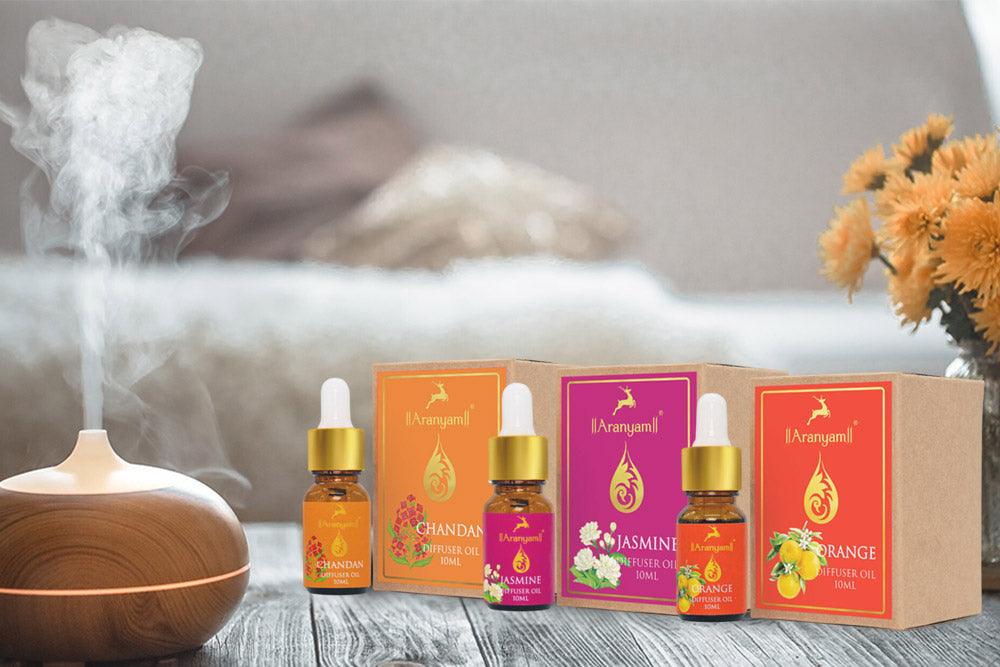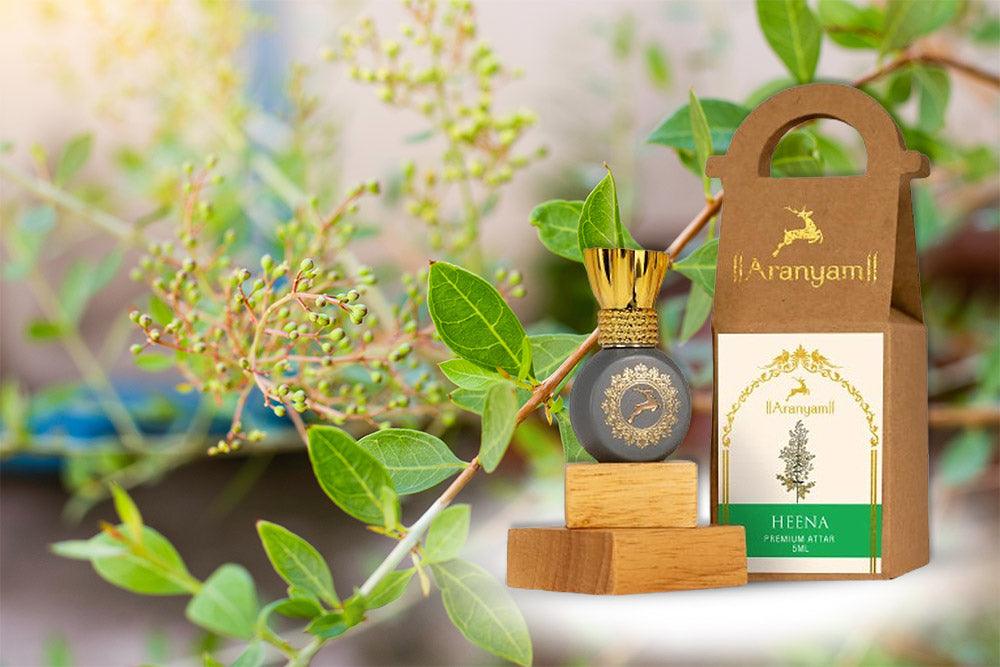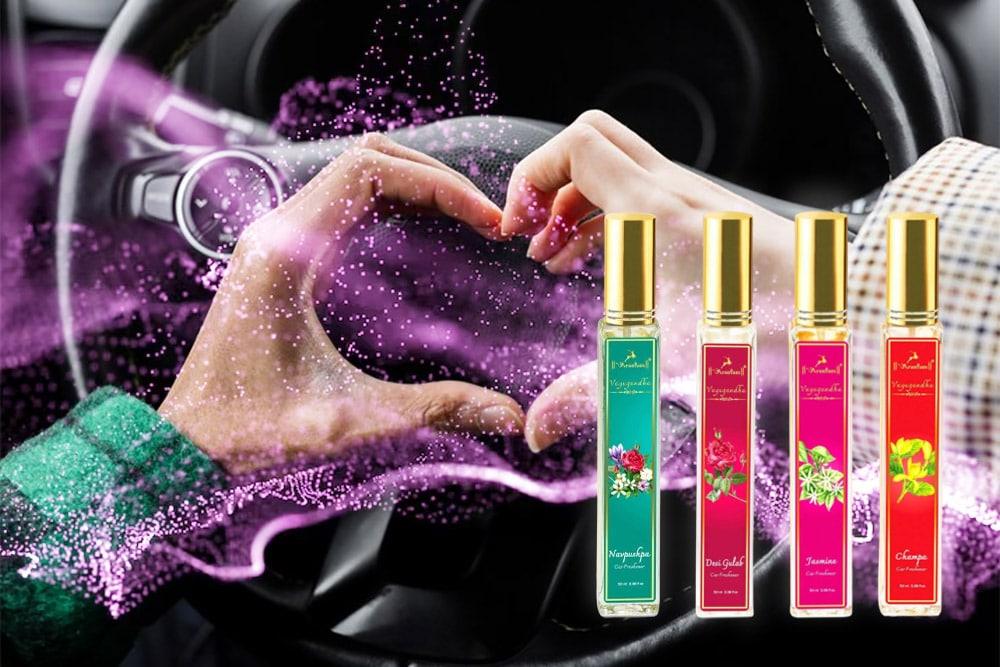
From Plant to Bottle: The Journey of Natural Diffuser Oils
The world of natural diffuser oils is an enchantment where the essence of nature is captured in a bottle, bringing the serenity of the outdoors into our homes and lives. These oils, derived from plants, carry the scent of their source and a piece of the natural world's soul. This article takes you on a fascinating journey, from the verdant fields where plants are nurtured to the meticulous oil extraction and bottling process. To illustrate this magical process, we'll mainly focus on Aranyam's Natural Diffuser Oils - Chandan (Sandalwood), Orange, and Jasmine.
The Starting Point: Cultivation and Harvesting
The journey begins in the lush fields and forests where the raw materials for natural diffuser oils are grown. Plants like Sandalwood, Orange, and Jasmine require specific climates and care to yield high-quality essences for premium oils.
Chandan (Sandalwood)
Sandalwood trees, known for their rich, woody fragrance, are cultivated in carefully managed plantations. These trees can mature up to 15-30 years, making Chandan oil one of the most precious in the market.
Orange
Orange trees, with their bright, citrus-scented blossoms, are typically grown in temperate climates. The peel of the orange fruit, abundant in essential oils, is harvested when the fruit is ripe for optimal fragrance quality.

Jasmine
Jasmine plants are treasured for their intensely fragrant flowers. They are hand-picked early morning when the flowers are still closed to preserve their delicate scent.
Extraction: Turning Plants into Essential Oils
After harvesting, the raw materials undergo extraction to isolate the essential oils. This process varies depending on the plant material and the desired quality of the oil.
- Steam Distillation for Chandan: Steam distillation is the preferred method for Sandalwood. Wood chips from the Sandalwood tree are steamed, releasing the fragrant oil, which is then cooled and separated from the water.
- Cold Pressing for Orange: The oil from orange peels is typically extracted through cold pressing. This mechanical process involves pressing the peel to release the oil without heat, preserving the oil's natural fragrance and properties.
- Enfleurage or Solvent Extraction for Jasmine: Given the delicate nature of Jasmine flowers, enfleurage or solvent extraction methods are often used. These gentle techniques ensure that the fragile aroma of Jasmine is not lost or altered during the process.
Refining and Quality Control
The extracted oils are then refined to remove any impurities. Quality control is a critical step in the journey of natural diffuser oils. At Aranyam, each batch of oil is rigorously tested to ensure it meets high standards of purity and fragrance. This involves checking for the right balance of natural compounds contributing to each oil's unique scent profile.
Blending and Bottling
The final step in the journey is the blending and bottling of the oils. For Aranyam's Natural Diffuser Oils, the pure essential oils of Chandan, Orange, and Jasmine are sometimes blended with other natural ingredients to create unique scents. These blends are carefully crafted to evoke certain moods and atmospheres, enhancing the ambiance of any space.
The oils are bottled in glass containers to preserve their quality and fragrance. The packaging is designed to protect the oils from light and air, which can alter their composition and scent.
Conclusion: Bringing Nature into Your Home
From the verdant fields and forests to the delicate process of extraction and meticulous blending, the journey of natural diffuser oils is a testament to the art and science of fragrance making. Aranyam's Natural Diffuser Oils - Chandan, Orange, and Jasmine - each tell a story of nature's bounty and the careful craftsmanship of capturing their essence.
These oils bring nature's soothing scents into our homes and connect us to the earth and its natural rhythms. As you diffuse these oils, remember their journey from plant to bottle, marked by patience, care, and a deep respect for nature. Whether you seek the grounding aroma of Chandan, the uplifting citrus notes of Orange, or the soothing floral scent of Jasmine, Aranyam's Natural Diffuser Oils offer a pure and natural way to enhance your living space and well-being.
Connect with us on Facebook, Instagram, YouTube
Frequently Asked Questions (FAQs) About From Plant to Bottle: The Journey of Natural Diffuser Oils
1. What are natural diffuser oils, and how do they differ from synthetic ones?
Natural diffuser oils are extracted directly from botanical sources like flowers, leaves, fruits, and bark. This extraction process can involve methods like steam distillation, cold-pressing, or solvent extraction. These oils capture the plant's pure essence, offering a complex and therapeutic aroma. Synthetic diffuser oils, on the other hand, are man-made replications of natural scents. While they may smell similar, they lack the depth and therapeutic benefits of their natural counterparts.
2. How are essential oils extracted for diffusers?
The most common method for extracting essential oils for diffusers is steam distillation. In this process, plant material is placed over steaming water. The steam rises, carrying the volatile aromatic compounds from the plant. The steam is then cooled, causing it to condense back into liquid form. This liquid contains the essential oil, which is then separated from the water. Other extraction methods include cold-pressing (often used for citrus oils) and solvent extraction (typically used for delicate flowers).
3. Are there different qualities of natural diffuser oils?
Absolutely! The quality of natural diffuser oils depends on several factors, including the plant source, the extraction method used, and the growing conditions. Factors like geographical location, climate, and harvesting time can all influence the oil's potency and therapeutic properties. Aranyam Perfumes & Attars prioritizes ethically sourced, high-quality essential oils to ensure you receive the purest and most beneficial diffusing experience.
4. How do I choose the right natural diffuser oil for my needs?
With a vast array of natural diffuser oils available, selecting the right one can feel overwhelming. Consider your desired outcome. Are you seeking relaxation, stress relief, or an uplifting mood boost? Different essential oils offer unique properties. Aranyam Perfumes & Attars offers a curated selection with detailed descriptions to guide your choice. You can also explore online resources or consult an aromatherapist for personalized recommendations.
5. How do I use a natural diffuser oil safely?
While natural, essential oils are highly concentrated and should be used with care. Here are some safety tips:
- Dilution is key: Never apply essential oils directly to your skin. Always dilute them in a carrier oil like jojoba or almond oil before topical application.
- Diffusion with care: Follow the diffuser manufacturer's instructions for proper use and dilution ratios. Avoid using diffusers for extended periods, especially around children and pets.
- Listen to your body: If you experience any irritation or discomfort while diffusing or using essential oils topically, discontinue use immediately.
6. Are essential oils safe for pets?
Certain essential oils can be toxic to pets, particularly cats. Consult a veterinarian before diffusing essential oils around pets. Safer alternatives for pet-friendly diffusing include citrus oils (lemon, orange) or floral oils (lavender) when diluted properly. It's always best to err on the side of caution and avoid diffusing altogether if you have concerns.
7. Can natural diffuser oils be used for medicinal purposes?
Aromatherapy, the practice of using essential oils for therapeutic benefits, has been around for centuries. While many essential oils possess properties that can promote relaxation, improve sleep, or ease headaches, it's crucial to remember they are not a replacement for medical treatment. Consult a qualified aromatherapist or healthcare professional before using essential oils for medicinal purposes.
8. How long do natural diffuser oils typically last?
The shelf life of natural diffuser oils varies depending on the type of oil, storage conditions, and exposure to light and heat. In general, citrus oils tend to have a shorter lifespan (around 1 year), while heavier oils like sandalwood or vetiver can last for several years (up to 5 years). Aranyam Perfumes & Attars provides recommended expiry dates on its products, and storing your oils in a cool, dark place will help maximize their lifespan.
9. How can I tell if a natural diffuser oil has gone bad?
There are a few ways to identify an expired or spoiled natural diffuser oil. The scent may become weak or unpleasant, or the oil may appear cloudy or change color. If you're unsure about the quality of your oil, it's best to err on the side of caution and discard it.
10. Aside from diffusers, how else can I use natural diffuser oils?
Natural diffuser oils have a multitude of uses beyond diffusers. You can add a few drops to your bathwater for a relaxing soak, create homemade cleaning products, or freshen up linens and dryer balls. Some essential oils can even be diluted for topical application (on the soles of your feet or wrists) for their therapeutic benefits. Always research safe dilution ratios before using essential oils.
11. What are carrier oils, and how do they work with essential oils?
Carrier oils are vegetable-based oils derived from sources like nuts, seeds, or plants. They are odorless or have a very mild scent, and their primary function is to dilute essential oils before topical application. Essential oils are highly concentrated and can irritate the skin if used undiluted. Carrier oils also help disperse the essential oil's aroma when used in a diffuser blend. Popular carrier oils for diffusers include jojoba oil, almond oil, and grapeseed oil.
12. Can I ingest natural diffuser oils?
Ingestion of essential oils is strongly discouraged. Essential oils are not intended for internal consumption and can be toxic if swallowed. If you are interested in exploring the internal use of essential oils for therapeutic purposes, consult a qualified aromatherapist or healthcare professional.
13. Is it safe to use essential oils during pregnancy?
Certain essential oils can be harmful during pregnancy. It's vital to consult a doctor or qualified aromatherapist before using any essential oils while pregnant. Avoid using stimulating or hormonally-active essential oils altogether during pregnancy.
14. How do I clean my diffuser after using essential oils?
Regular cleaning of your diffuser is essential to maintain optimal performance and prevent clogging. The cleaning method may vary depending on your diffuser type. Generally, you can follow these steps:
- Wipe down the interior of the diffuser with a soft cloth dampened with water and a mild, natural soap.
- You can also run a short diffusion cycle with water and a few drops of white vinegar to help remove any residue.
- Dry the diffuser thoroughly before using it again.
15. Where can I buy high-quality natural diffuser oils?
Aranyam Perfumes & Attars offers a curated selection of premium, ethically sourced natural diffuser oils. Our oils are carefully chosen to ensure purity and potency, providing you with the best possible aromatherapy experience. You can browse our selection online or visit our store to explore the captivating world of essential oils.
16. Can I blend different essential oils for my diffuser?
Absolutely! Blending essential oils allows you to create custom diffuser experiences that cater to your specific needs. Research the properties of different oils and experiment to find combinations that you enjoy. Aranyam offers diffuser blend recommendations as a starting point, but there's a whole world of creative possibilities to explore!
17. What are some safety precautions to take when using essential oils around children?
Children are more sensitive to essential oils than adults. Here are some safety tips to remember:
- Keep diffusers out of reach of children.
- Never apply essential oils directly to a child's skin.
- Diffuse essential oils for short intervals only, especially around young children.
- Consider using a cool-mist diffuser instead of a nebulizing diffuser, as nebulizers produce a more concentrated mist.
18. Are there any essential oils that are particularly phototoxic?
Phototoxicity is a rare reaction where exposure to sunlight after applying certain essential oils can cause skin irritation or discoloration. Citrus oils (lemon, grapefruit, bergamot) are some of the most common essential oils that exhibit phototoxic properties. If you're using a citrus oil topically, avoid direct sunlight for several hours after application.
19. How can I dispose of expired essential oils safely?
Never pour essential oils down the drain or dispose of them in your household trash. The safest way to dispose of expired essential oils is to soak them up with absorbent material like coffee grounds or kitty litter and then discard them in your regular trash.
20. What are some interesting facts about natural diffuser oils?
The history of essential oil use stretches back thousands of years. Ancient Egyptians, Greeks, and Romans all employed essential oils for medicinal and cosmetic purposes. The global essential oil market continues to flourish today, as people discover the vielfältig (German for "various" or "manifold") benefits that these natural products offer for well-being and creating a relaxing atmosphere.




